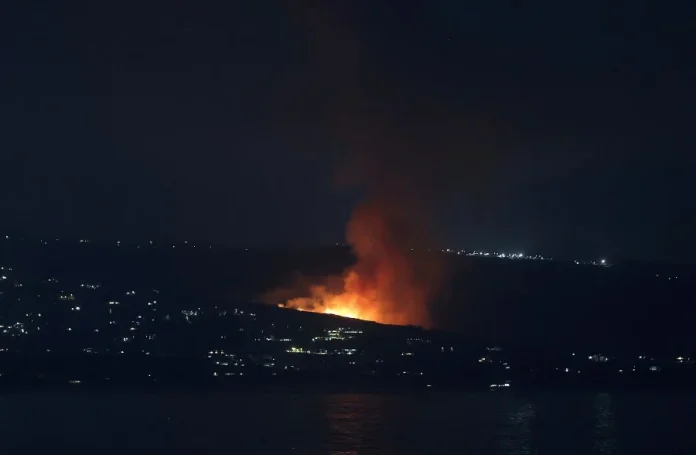Hezbollah carried out the attack on Israel in response to the assassination of senior commander Fuad Shukr in the capital Beirut, the Shiite militia allied with Iran announced.
The group had earlier vowed a significant response to the targeted killing of Fuad Shukr, prompting fears that months of strikes could escalate into all-out war.
Hezbollah fired hundreds of rockets into Israel on Sunday morning in the beginning of a retaliatory attack. It targeted the identified “special military target” as well as Israel’s Iron Dome platforms. Hezbollah said the militia fired more than 320 rockets at Israeli military bases and hit 11 targets. The first phase of its attack ended, but it will take some time before the retaliatory attack reaches full completion.
In northern Israel, warning sirens wailed and multiple explosions rang out in several neighbourhoods as Israel’s Iron Dome air defence system shot down rockets coming from southern Lebanon. Israel’s Magen David Adom ambulance service said it was on high alert throughout the country.
Israel, for its part, said it would respond to events on the ground but was not seeking a full-scale war. Defence Minister Yoav Gallant said Israel will do whatever is necessary to defend itself, adding that it has issued a 48-hour emergency declaration that will allow the Israel Defence Forces (IDF) to issue instructions to Israeli citizens, including restricting assembly and closing places.
Hence, the IDF launched strikes inside Lebanon early Sunday morning, saying the Iranian-backed Hezbollah movement was preparing to launch rockets and missiles towards Israel. The air force struck 40 targets.
“We have conducted precise strikes in Lebanon in order to thwart an imminent threat against the citizens of Israel. We are closely following developments in Beirut, and we are determined to use all the means at our disposal in order to defend our citizens,” Gallant said in the statement, adding that the military is ready to strike anywhere there is a threat.
In addition, Israel had to declare a state of emergency, according to the defence minister; also, flights to and from Ben-Gurion Airport in Tel Aviv suspended for about 90 minutes, but airport officials said normal operations expected to resume by 7 a.m. In fact, no casualties reported in Israel, according to the ambulance service.
The exchange of attacks comes as delegations from the US, Israel, Qatar and Egypt hold another round of ceasefire talks in Cairo. The Hamas delegation was also due in Cairo, but the senior Hamas official emphasised earlier that the group would not participate directly in Sunday’s talks, but would instead receive briefings from Egypt and Qatar. In addition, Prime Minister Benjamin Netanyahu has clashed with Israeli ceasefire negotiators over his insistence that Israel not withdraw from the Philadelphi corridor in the southern Gaza Strip.
Earlier this month, White House national security spokesman John Kirby said the US was preparing for a possible attack by Iran and its proxies in retaliation for the killings. In response to the threats, the USS Abraham Lincoln, an aircraft carrier equipped with F-35 fighter jets, and the USS Georgia, a guided missile submarine, were recently deployed to the Middle East.
The tensions of Israel and Hezbollah has raised fears of a broader regional conflict potentially involving both the US and Iran. President Joe Biden has been closely following the developments, the White House said.
At his direction, senior U.S. officials have been communicating continuously with their Israeli counterparts. We will keep supporting Israel’s right to defend itself, and we will keep working for regional stability, according to National Security Council spokesperson Sean Savett.
The conflict between Israel and Hezbollah began to escalate rapidly after Hamas attacked Israel on 7 October. Israel launched a counter-offensive on the Gaza Strip that left more than 40,000 Palestinians, mostly women and children, dead, according to Palestinian health authorities. Since then, and amid ongoing hostilities, Hezbollah and Israel have constantly exchanged fire while avoiding a major escalation as the war rages in Gaza to the south.
